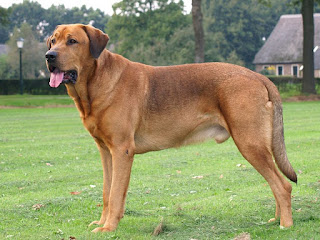The Broholmer, also called the
Danish Mastiff, is a large Molosser breed of dog from Denmark, recognized by
the Danish Kennel Club and the Fédération Cynologique Internationale. It has
been employed as a guard dog in the homes of the wealthy. The breed's numbers
dwindled severely during World War II, but the dog made a successful return in
the 1970s.
Description
The
Denmark Broholmer is a dog that strongly resembles a Mastiff. It is large and
powerful, with a loud, impressive bark and dominant walk. A well trained
Broholmer should be calm, good tempered, and friendly, yet watchful towards
strangers. Females stand about 27.5 inches (70 cm) and weigh in at 90–130
pounds (41–59 kg). Males stand about 29.5 inches (75 cm) and weigh in at
110–150 pounds (50–68 kg). The body is built square and rectangular with a
large and massive head. The width and length of the skull and the length of the
nose should be of equal length. The head is generally not carried very high.
The coat is short and harsh, and the color can be light or brownish yellow, or
black. Some white markings on the coat are permitted, and a black mask may be found.
The average life span is around 7–12 years.
Historical note
The
Broholmer breed was generated from a cross between English Mastiffs and local
dogs in Germany, and was named after Sehested of Broholm, a game-keeper who
lived in the 18th century. During the Second World War, the Broholmer became a
victim of the strife and almost became extinct, but was saved by a group of
Danish enthusiasts after isolated members were found in the 1970s. King
Frederick VII and his consort, Countess Danner were owners of several
Broholmers and one of their portraits depicts them with one of their dogs. The
breed was established in the early 19th century and was moderately popular,
especially as a guard dog in the homes of wealthy Danes.The Breed was imported
to the UK in 2009 with a view to being put on the UK kennel clubs import list.






No comments:
Post a Comment